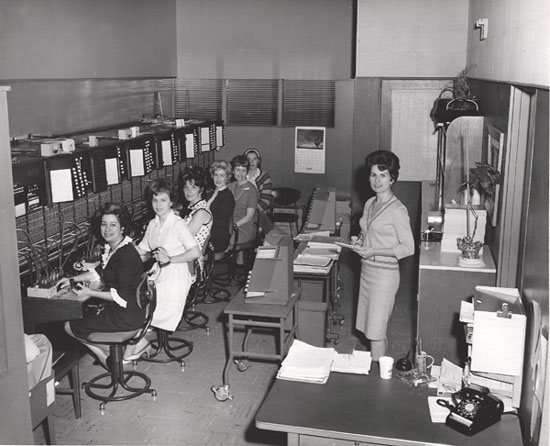

HP Memories
One of our main objectives in starting this website five years ago was (and still is today) to get in touch with people who have worked at HP from the birth of the company up to today. We are interested in hearing your memories no matter what division or country you worked in, or whether you were in engineering, marketing, finance, administration, or worked in a factory. This is because all of you have contributed to the story of this unique and successful enterprise.
Your memories are a treasure for this website. While product and technology are our main concern, other writings related to the company life are highly welcome, as far as they stay inside the HP Way guidelines.
The contributions made by Betty Haines during her career at HP are illustrated in this chapter. This chapter is a good example of the type of memories we like to present on this website.
Many thanks Betty for this highly valuable contribution.
Anybody Else ? Please get in touch using the Contact US form.
Thank You for Calling Hewlett Packard
RAMBLINGS OF AN HP HELLO GIRL
by Betty Haines
Foreword by John Minck
There was no doubt, on the first day you showed up for work at the Hewlett-Packard facility in Buildings 1 – 4 in the late 1950s, there was one slightly unsettling environmental condition of those one-acre wide-open office bays. It was the paging voices of the HP telephone operators. They were also active in the old plant complex down by the Alma Street railroad tracks. This was decades before Voice-mail or phone answering machines were even a gleam in the inventor’s mind. The melodious (some would say sexy) voices would interrupt your thinking at the beginning, “Ed Porter, please dial 4, Ed Porter.” With the magic ability of the human brain to ignore extraneous noise and sounds, it would only take about a day for the incessant paging all day long to just become a part of the office background, ONLY until your own name came along. Then, remarkably, your attention clicked on and you dialed “4.” Our HP telephone PBX (Bell Telephone’s nomenclature for Private Branch Exchange) operators were amazing people. They were the “face” of HP, “Thank you for calling Hewlett-Packard, may I help you?” Friendly, efficient, quickly picking up the call if the dialed extension didn’t answer, or the admin didn’t pick up. Immediately they went to the paging system. It all worked extremely well, and as more and more operators were needed to handle the increasing success of HP, the operators devised methods to transfer calls and paging answers to the right line or operator. Betty’s memoir made me laugh, a LOT. Betty remembers those days of personal attention to customers and to all of the hundreds of internal employees. She notes that it was Dave Packard who christened those operators as “HP’s Hello Girls.” Even as the inbound call loads peaked, their friendly spirit never left them. They must have felt stress at times, but we never knew it. And Betty was the kind of personality who made it fun to work at HP. Who else would make a Christmas-time announcement on the PA system (without permission), “Would the person who parked their sleigh and reindeer over Barney’s office, please move their vehicle!” The most charming parts of this remembrance of several decades is that we see the personal level of a great corporation. High level executives get jokes played on them, we see the foibles of the daily routine of business life interspersed with a light heartedness that really did give HP a unique style of work culture. Betty saw and remembers so much of this because she sat at the heart of the communications of our great company. And her powers of remembering so many of the funny incidents will amaze you as you glide through this memoir. When you get to the place where Bill Hewlett says, I’m glad I’m the Huler…,” you will laugh out loud. She was also at the heart of the mobilization of HP’s facilities and emergency teams as they responded to the devastation caused by the 1989 Loma Prieta earthquake. Most facilities were back on line relatively quickly—I remember in Bldg 5U that many of those high hanging fluorescent fixtures jumped out of their hooks and came down on the floor. We were SO fortunate that most people left early to watch the World Series at Candlestick Park. But there was $4 million (unofficial) dollars of damage in the Deer Creek facility, when a major water main broke and flooded labs and the computer room. Finally, it should be mentioned that these mellifluous voices also appeared in the rest rooms. For new employees or visiting customers, it was always quite a shock to have a soothing female voice coming from out of the sky, over your shoulder, as you went about your business.
John Minck
|
 |
| The Operators’ Room - 1501 Page Mill Road, Palo Alto, circa- 1966 Standing, Bea Panetta, Chief Operator - Seated (l to r), Peggy Coppe, Betty (Platt) Haines, Virginia (Quinette) Otto, Hazel Smith, Doris Perkins, Judy Horder |
Thank You for Calling Hewlett Packard
RAMBLINGS OF AN HP HELLO GIRL
by Betty Haines
![]() Click here to download Betty's Memories - The 25 pages document is a 1.25 Mb PDF file.
Click here to download Betty's Memories - The 25 pages document is a 1.25 Mb PDF file.
Becoming a Hello Girl
On my way home from work one afternoon, I decided to do a little shopping at Maximart, in Palo Alto, near the HP plant. Not long after I entered the store, I glanced up and saw David Packard approaching me. "Hi, Mr. Packard," I greeted. He smiled and said, "I don’t recall your name; but, I know you are one of the ahh…….." At this point his voice trailed off and he seemed annoyed at being unable to come up with the words he wanted; he cleared his throat and continued, "You answer the phones up at the plant; you’re ah – mm - a Hello Girl." I grinned and said, "I’m a PBX operator, Mr. Packard". He nodded his head in apparent relief at having the needed words provided.
He quickly recovered his composure and explained that Mrs. Packard had asked him to stop on his way home and pick up a couple of spare ice cube trays for their freezer. He said there was a larger selection than he anticipated and asked if I would help him decide. We walked over to where the ice cube trays were displayed and I helped him make a selection. Before we went our separate ways, I quipped, “Mr. Packard, I just may steal that Hello Girl job title that you bestowed on me; I like it.”
And that is how I became a Hello Girl !
After that exchange, Mr. Packard would occasionally joke with me about being a Hello Girl; one time he referred to me as his favorite Hello Girl. After receiving that honor, it took a week for the swelling in my head to deflate enough to get a headset on it.
A Feminist Is Insulted
Mr. Packard’s dubbing me a Hello Girl inadvertently contributed to one of my more distasteful experiences at Hewlett Packard. At the height of the feminist movement, a female member of the Personnel Department overheard a portion of a hallway conversation between Mr. Packard and me. In this conversation, he referred to me as a Hello Girl. Perhaps the partition that was between where we were talking and where she was sitting muffled the conversation. But I suspect her anti-chauvinism attitude contributed greatly to her misunderstanding of the conversation. Whatever the reason, she failed to grasp the tone of our joking; her brain zeroed in on the word girl, came to a ridiculous conclusion and she was dumb enough to act on it.
Later that day, she contacted me and asked that I come to her desk. When I arrived, she proceeded to lecture me about the folly of allowing any man to address me in such a belittling, demeaning, and unacceptable manner. She told me that Mr. Packard’s calling me “girl” was unacceptable and that I owed it to my sisters to call him on it. When she finally allowed me to speak, I informed her of a few things: 1) I found it unacceptable for any member of the personnel department to hide behind a cubicle wall listening to other peoples’ conversations and not speak up if they were offended by anything they heard, 2) my relationship with Mr. Packard was based on mutual respect and he would never demean me or the job I did for his company, 3) I felt no obligation to the sisterhood and considered most of what they did a silly waste of time, 4) if she was offended by or objected to Mr. Packard’s action it was her place to call him on it - not mine.
When I left her desk, I was worried that perhaps I had been out of line or a little too blunt. However that concern dissipated when I walked passed Ed King (who was Personnel Manager, at the time) and he slapped me a low five.
 |
| David Packard – (circa 1960's) - (With Dr. Wallace Sterling of Stanford University) |
Yes, I called him Pappy
I enjoyed Mr. Packard’s casual and comfortable way of interfacing with his employees. When I heard them address him as Pappy, it seemed natural that I begin addressing him that way also. My favorite memories of Pappy include:
- The year I chaired the serving committee at a Little Basin picnic and was awed that Pappy, Ralph Lee and Ed Porter were among the executives who allowed me to order them around the cook shed and serving lines.
- When Pappy was in town at Christmas time, he would come down to the Metal Fabrication shop (at 395 Page Mill Road) for some delicious Carl Buchhass roast beef. This beef was cooked on a contraption that Carl and Dick Arms designed and built. They used piano wire to suspend a side of beef over a heat source in the shop. Carl knew exactly how to pluck the wires to rotate the beef so that it cooked evenly on all sides. Pappy enjoyed watching Carl pluck these wires and when the beef was done to Carl’s satisfaction, he helped slice and serve the beef to the site employees who gathered in the shop. Whenever I saw him at these roast beef feeds, he always remembered my name. He did occasionally ask how the “hello” business is going.
- My favorite Pappy incident occurred at Frank Cavier’s retirement party. It was a huge shindig at the Palo Alto Elks club. The stage was filled with company executives and local big-wigs who would be speaking on this occasion. As the emcee (I think it was Hal Dugan) was making his opening remarks, Pappy stood up, took the microphone from him and said, “Stop this celebration. There is an important person missing from this stage. Frank’s success at the company wouldn’t have happened without this person. Get Mary up here, now!” He stood there, held the microphone and waited while a chair was fetched and Mary Cavier, Frank’s wife, was brought up out of the audience.
Thank You for Calling Hewlett Packard
- End of Introduction -
Choose Next Chapter in Selector Below

